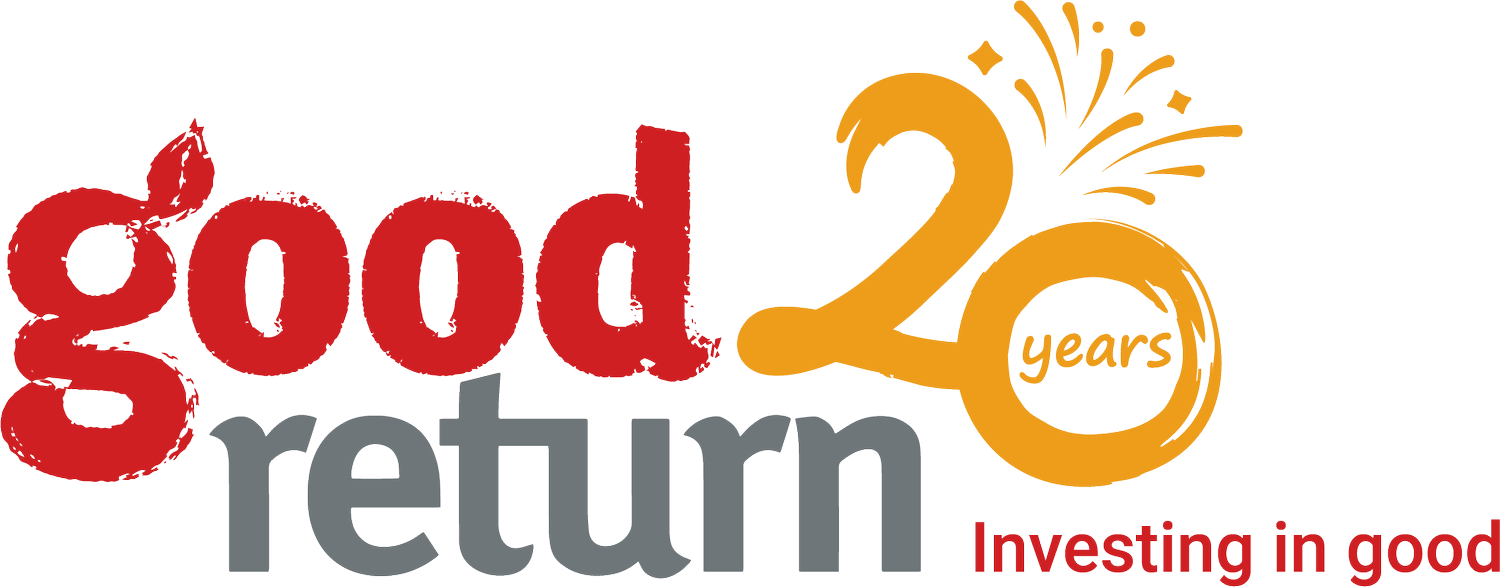The road very travelled: Good Return’s commitment to rural communities.
The road very travelled: Good Return’s commitment to rural communities.
Good Return’s Mimu Raghubanshi, Diana Tjoeng, and consultant Prasansha on a recent CAFE site visit to Kaule, Nepal.
Imagine.
It’s -2 degrees Celsius. Your breath fogs up the bus window as you rumble and bump along the road. Rising to your left, an imposing mountain range. To your right, a sheer drop. You are in the Solukhumbu district in the Mt Everest region of Nepal and your bus is on a 14-hour off-track trip from Kathmandu. Whilst the bus will take you as far as it can go – a two day, 15,000-step-a-day trek through hilly terrain still awaits you. You are a member of Good Return’s Nepal team, and alongside local partner Solukhumbu Development Society, you are travelling to women in remote communities to deliver financial capability training.
9,173 km away.
Your small boat glides through calm, crystal clear water. A chorus of insects buzz in the background and the tropical climate is hot. When your boat arrives on land, you’ll be able to catch a local bus some of the way. However, to complete the trip - a 7km walk through dense, lush rainforest is also on the agenda. You are a financial capability coach in Guadalcanal province, Solomon Islands. A month ago, you graduated as a coach from a financial literacy program (CAFE) led by Good Return and the Central Bank of the Solomon Islands (CBSI). Today, you are on your way to meet a Women Savings Club who are eager to learn new financial skills and sustainable long-term financial planning strategies. Most of the women in the club are subsistence farmers or traditional gardeners from remote communities. Their savings group is one of the only means of financial services they can access. These women will have taken a similarly long journey to attend the training themselves.
Guadalcanal, Solomon Islands
1821.56 km away.
As an officer’s wife, you live in a Defence Force Barracks on the outskirts of Port Moresby, PNG. With little money to spare and a rising cost of living, your financial goals are primarily to earn enough for daily expenses and to keep your kids in school. While your home is partly accessible by car, the roads end a few kilometres before the site and visitors must walk to reach your community. In this context, you are surprised when a member of your community, alongside two staff members from Good Return (including someone from the Philippines!), initiate a financial education program in your community. You are excited to have your voice heard and the opportunity to learn money management skills with other women in your community.
These are just three examples of the extensive journeys that our participants, coaches and the team at Good Return complete to achieve our ultimate aim: to bring the excluded into the economy.
Lack of financial capability is one of the key causes of disadvantage globally. Worldwide, only 33% of adults understand basic financial concepts. This statistic rises significantly for rural or hard to reach communities. To combat this, Good Return works with marginalised and indigenous communities living in remote communities as well as in urban settings.
Good Return’s financial capability programs (CAFE) provides education in money management and business skills to economically empower low-income women and the financially excluded. Our women learners leave the training understanding the basics of budgeting and build confidence with financial knowledge to support themselves, their families and communities.
Good Return’s Janine Aringa-Garap with CAFE participants in Port Moresby.
Of course, there are challenges with navigating this level of travel. Our teams must prepare and plan meticulously for these huge trips. Other challenges include language and effective communication. For example, in remote mountainous Nepal, Nepali is not the local language. The trainers are required to translate from Nepali into local dialects. That said, Mochan Bhattarai, Good Return’s former Nepali Country Coordinator explained that “Whilst this level of travel can be exhausting the journeys also provide an opportunity for the trainers and program coordinators to discuss the program and build rapport on the way”.
The team at Good Return continues to be blown away by the lengths the women we work with will go to to take part in CAFE training. Most participants are managing the household, farm work, or small businesses - or all three! Making time for the journey is no small task.
The wider team at Good Return is also grateful to our in-country staff for their continued dedication to financial inclusion and economic empowerment for all – demonstrated through their patience, sense of adventure and determination in these journeys.
Good Return’s CAFE Initiative is delivered in partnership with the Australian Government through the Australian NGO Cooperation Program (#ANCP).



